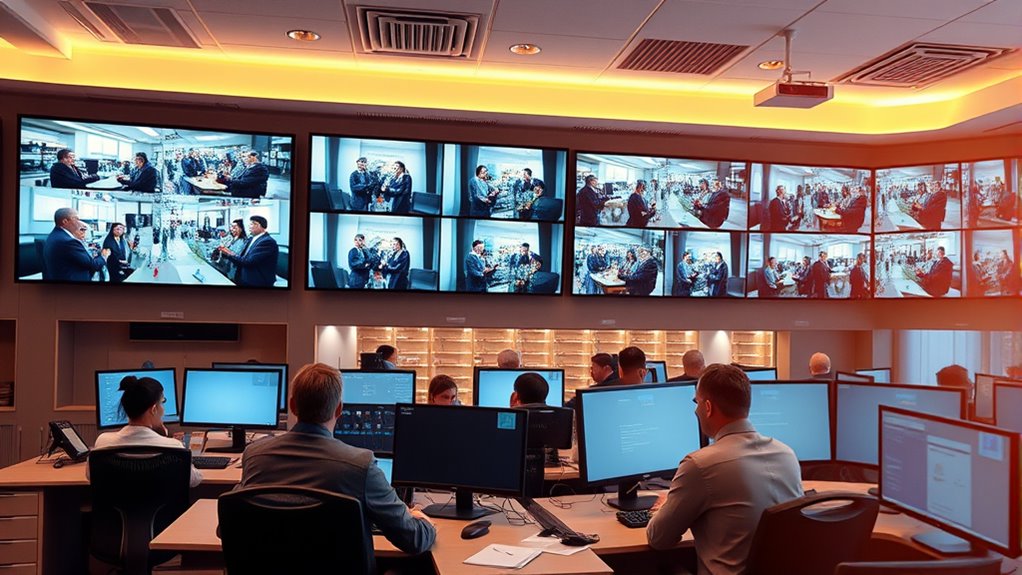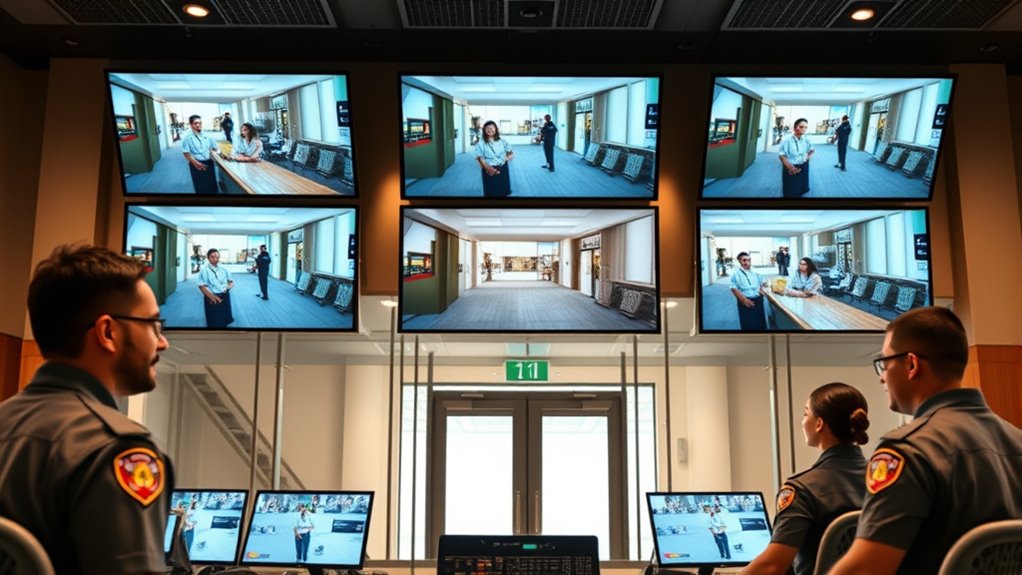A security philosophy that’s safe, friendly, and effective guides you to protect your assets while making security approachable. You focus on safeguarding through preventative measures, like strong controls and quick responses, all while fostering trust through transparency and user-friendly practices. This approach ensures robust protection without creating barriers or discomfort. If you want to build a security culture that’s resilient, welcoming, and sustainable, exploring these principles further will give you valuable insights.
Key Takeaways
- Establish a security mindset that prioritizes protection, approachability, and adaptability to foster trust and cooperation.
- Balance strong safety measures with user-friendly designs to prevent threats without creating barriers.
- Continuously assess and update security strategies to ensure effectiveness against evolving threats.
- Promote a security culture through transparent communication and accessible training to encourage voluntary compliance.
- Integrate safety, friendliness, and efficiency to create a sustainable, resilient security environment.

A security philosophy guides how organizations and individuals approach protecting their assets, information, and operations. It sets the foundation for decision-making, behaviors, and the overall mindset towards security. When you adopt a clear philosophy centered on being safe, friendly, and effective, you create a framework that balances protection with approachability. This approach ensures your security measures are not only robust but also user-friendly, fostering cooperation rather than resistance.
You start by prioritizing safety, understanding that the core purpose of security is to safeguard your assets from threats. This means implementing preventative measures, such as strong access controls, regular updates, and proactive monitoring. Safety isn’t just about installing the latest technology; it’s about cultivating a culture where everyone recognizes the importance of security and acts accordingly. When your team understands the risks and follows best practices, your overall security posture improves. Safety also involves preparing for incidents through clear response plans and quick recovery strategies, so that when breaches occur, damage is minimized and trust remains intact.
Prioritize safety through strong controls, culture, and prepared response plans to protect assets and maintain trust.
Next, you emphasize friendliness, recognizing that security shouldn’t be intimidating or obstructive. A friendly security approach encourages participation rather than resistance. You achieve this by designing user-friendly systems, providing accessible training, and communicating transparently about policies. When users feel supported and understand the purpose behind security protocols, they’re more likely to comply willingly. This fosters a collaborative environment where security becomes a shared responsibility rather than a burden. The goal is to make security seamless and non-disruptive, so people don’t see it as an obstacle but as an integral part of their daily workflow.
Finally, you focus on effectiveness. Your security measures must actually work, preventing threats and mitigating risks efficiently. Effectiveness requires continuous assessment and adaptation, staying ahead of evolving threats. You test your defenses regularly, update policies as needed, and leverage the latest technology to stay resilient. An effective security philosophy doesn’t rely on static solutions; it’s dynamic, responsive, and aligned with your organization’s goals. When safety, friendliness, and effectiveness come together, you create a security environment that’s not only strong but also sustainable and supportive. This balanced approach helps you protect your assets without creating unnecessary friction, ensuring your security efforts are all-encompassing, approachable, and resilient over time. Incorporating awareness of renewable energy sources can also contribute to more sustainable security practices by reducing environmental impact.
Frequently Asked Questions
How Does Security Philosophy Adapt to Emerging Cyber Threats?
You adapt your security philosophy to emerging cyber threats by continuously updating your strategies, tools, and defenses. Stay informed about the latest attack methods, invest in advanced technologies like AI and machine learning, and prioritize ongoing staff training. You also conduct regular risk assessments and incident simulations to identify vulnerabilities. By remaining flexible and proactive, you guarantee your security approach stays effective against evolving cyber threats.
What Role Does User Behavior Play in Security Effectiveness?
User behavior is like the keystone in an arch—if it’s strong, the whole security structure stands firm. Your habits, like using complex passwords and avoiding suspicious links, directly impact effectiveness. When you stay alert and follow best practices, you prevent breaches and reinforce the security system. Conversely, careless actions can open doors for cyber threats. Your proactive engagement makes all the difference in maintaining a safe and effective environment.
How Can Small Businesses Implement a Strong Security Philosophy?
You can implement a strong security philosophy by starting with clear policies and regular staff training. Use strong passwords, enable two-factor authentication, and keep software updated. Foster a culture of security awareness where everyone feels responsible. Invest in reliable security tools and backups. Encourage open communication about security threats to catch issues early. By prioritizing these steps, you create a safer, more resilient business environment.
What Are Common Pitfalls in Applying a Security-Friendly Approach?
You might think being too friendly with security means letting your guard down, but ironically, it’s a common pitfall. You could overlook updates or underestimate threats, assuming friendliness equals safety. Overcomplicating policies, neglecting staff training, or ignoring ongoing risks also hampers your efforts. Stay vigilant, keep security simple, and treat your approach as an ongoing process—otherwise, your “friendly” stance might just invite trouble instead of warding it off.
How Does Security Philosophy Influence Organizational Culture?
Your security philosophy shapes your organizational culture by setting expectations for behavior and attitudes toward safety. When you prioritize a friendly, effective approach, you foster trust and open communication, encouraging employees to actively participate in security practices. This positive environment reduces resistance and promotes shared responsibility. As a result, your organization becomes more resilient, adaptable, and committed to maintaining security, creating a strong, collaborative culture rooted in safety and mutual respect.
Conclusion
Remember, your security philosophy is like a sturdy shield—keeping you safe, friendly, and effective. By embracing these principles, you create a fortress that’s both welcoming and strong against threats. Stay vigilant, adapt, and prioritize trust, because security isn’t just a wall; it’s a living, breathing part of your everyday life. When you act with care and confidence, you’re weaving a safety net that catches you before trouble even has a chance to land.










